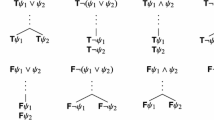Abstract
Section 1 contains a survey of options in constructing a formal system of dialogue rules. The distinction between material and formal systems is discussed (section 1.1). It is stressed that the material systems are, in several senses, formal as well. In section 1.2 variants as to language form (choices of logical constants and logical rules) are pointed out. Section 1.3 is concerned with options as to initial positions and the permissibility of attacks on elementary statements. The problem of ending a dialogue, and of infinite dialogues, is treated in section 1.4. Other options, e.g., as to the number of attacks allowed with respect to each statement, are listed in section 1.5. Section 1.6 explains the concept of a ‘chain of arguments’.
From section 2 onward four types of dialectic systems are picked out for closer study: D, E, Di and Ei. After a preliminary section on dialogue sequents and winning strategies, the equivalence of derivability in intuitionistic logic and the existence of a winning strategy (for the Proponent) on the strength of Ei is shown by simple inductive proofs.
Section 3 contains a — relatively quick — proof of the equivalence of the four systems. It follows that each of them yields intuitionistic logic.
Similar content being viewed by others
References
Barth, E. M. and E. C. W. Krabbe: 1982, From Axiom to Dialogue. A Philosophical Study of Logics and Argumentation, Walter de Gruyter, Berlin.
Beth, E. W.: 1962, Formal Methods. An Introduction to Symbolic Logic and to the Study of Effective Operations in Arithmetic and Logic, Reidel, Dordrecht.
Felscher, W.: 1982, ‘Dialogues as a Foundation for Intuitionistic Logic’, preprint, To appear in: D. M. Gabbay and F. Günthner (eds.), Handbook of Philosophical Logic, III, Reidel, Dordrecht, forthcoming.
Felscher, W.: 1983, ‘Dialogues, Strategies, and Intuitionistic Provability’, preprint.
Gethmann, C. F.: 1980, Theorie des wissenschaftlichen Argumentierens, Suhrkamp, Frankfurt-on-Main.
Gethmann, C. F. (ed.): 1982, Logik und Pragmatik. Zum Rechtfertigungsproblem logischer Sprachregeln, Suhrkamp, Frankfurt-on-Main.
Haas, G.: 1980, ‘Hypothesendialoge, konstruktiver Sequenzenkalkül und die Rechtfertigung von Dialograhmenregeln’, in: C. F. Gethmann (ed.), (1980) pp. 136–161.
Hamblin, C. L.: 1970, Fallacies, Methuen, London.
Kamlah, W. and P. Lorenzen: 1973, Logische Propädeutik. Vorschule des vernünftigen Redens, 2nd ed., Bibliographisches Institut, Mannheim, etc. (1st ed.: 1967).
Kindt, W.: 1970, Dialogspiele (Diplomarbeit), Freiburg.
Kindt, W.: 1972, Eine abstrakte Theorie von Dialogispielen (Inaugural Dissertation), Freiburg.
Krabbe, E. C. W.: 1982, Studies in Dialogical Logic (dissertation), Groningen.
Krabbe, E. C. W.: 1982a, ‘Modal Dialectics’, in: Krabbe (1982), pp. 206–245.
Krabbe, E. C. W.: 1982b, ‘Essentials of the Dialogical Treatment of Quantifiers’, in: Krabbe (1982), pp. 249–257.
Krabbe, E. C. W.: 1982c, ‘Formal Dialectics as Immanent Criticism of Philosophical Systems’, in: E. M. Barth and J. L. Martens (eds.), Argumentation. Approaches to Theory Formation. Containing the Contributions to the Groningen Conference on the Theory of Argumentation, October 1978, John Benjamins, Amsterdam, pp. 233–243. Reprinted in Krabbe 1982, pp. 70–79.
Krabbe, E. C. W.: 1984, ‘Noncumulative Dialectical Models and Formal Dialectics,’ to appear in the Journal of Philosophical Logic. An earlier version appeared in Krabbe (1982), pp. 177–205.
Lorenz, K.: 1961, Arithmetik und Logik als Spiele (Inaugural Dissertation), Kiel. Selections reprinted in: P. Lorenzen and K. Lorenz (1978), pp. 17–95.
Lorenz, K.: 1973, ‘Die dialogische Rechtfertigung der effektiven Logik’, in: F. Kambartel and J. Mittelstrass (eds.), Zum normativen Fundament der Wissenschaft, Athenäum, Frankfurt-on-Main, pp. 250–280. Reprinted in: P. Lorenzen and K. Lorenz (1978), pp. 179–209.
Lorenz, K.: 1968, ‘Dialogspiele als semantische Grundlage von Logikkalkülen’, Archiv für mathematische Logik und Grundlagenforschung 11, 32–55 and 73–100. Reprinted in: P. Lorenzen and K. Lorenz (1978), pp. 96–162.
Lorenzen, P.: 1960, ‘Logik und Agon’, in: Atti del XII Congresso di Filosofia (Venezia, 12–18 Settembre 1958), IV: Logica, linguaggio e comunicazione, Sansoni, Florence, pp. 187–194. Reprinted in: P. Lorenzen and K. Lorenz (1978), pp. 1–8.
Lorenzen, P. and K. Lorenz: 1978, Dialogische Logik, Wissenschaftliche Buchgesellschaft, Darmstadt.
Lorenzen, P. and O. Schwemmer: 1975, Konstruktive Logik, Ethik und Wissenschaftstheorie, 2nd. ed., Bibliographisches Institut, Mannheim, etc. (1st ed., 1973).
Mayer, G.: 1981, Die Logik im Deutschen Konstruktivismus. Die rolle formaler Systeme im Wissenschaftsaufbau der Erlanger und Konstanzer Schule (Inaugural Dissertation), München.
Schütte, K.: 1968, Vollständige Systeme modaler und intuitionistischer Logik, Springer, Berlin, etc.
Stegmüller, W. and M. Varga von Kibéd: 1984, Strukturtypen der Logik, Springer, Berlin, etc., Probleme und Resultate der Wissenschaftstheorie und Analytischen Philosophie, III.
Thiel, Chr.: 1978, ‘Duality Lost? Transforming Gentzen Derivations into Winning-Strategies for Dialogue Games’, Teorema 8, 57–66. University of Valencia.
Thiel, Chr.: 1980, ‘Über Ursprung und Problemlage des argumentationstheoretischen Aufbaus der Logik’, in: C. F. Gethmann (ed.), (1980), pp. 117–135.
Author information
Authors and Affiliations
Rights and permissions
About this article
Cite this article
Krabbe, E.C.W. Formal systems of dialogue rules. Synthese 63, 295–328 (1985). https://doi.org/10.1007/BF00485598
Issue Date:
DOI: https://doi.org/10.1007/BF00485598




